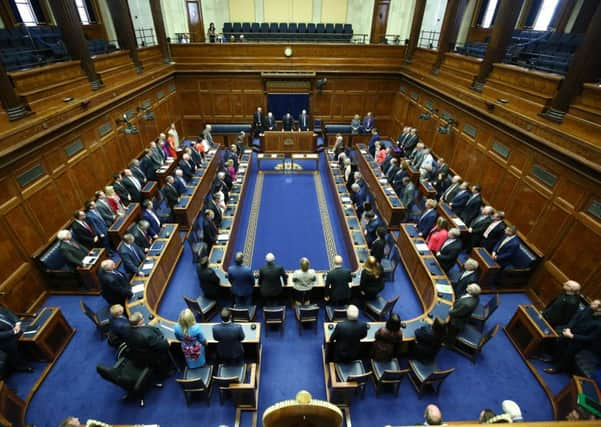Sam McBride: Key issue in any snap election would be DUP's veto


Yesterday morning Gerry Adams released a statement which combined the RHI debacle with the Irish language, the Maze prison site, “legacy and truth recovery mechanisms” and Nama.
Having for months told the public that its close partnership with the DUP was a ‘fresh start’ and having mocked the Opposition’s lack of power, suddenly Sinn Fein is openly attacking its coalition partner.
Advertisement
Hide AdAdvertisement
Hide AdSinn Fein has a history of packaging multiple disputes into a ‘crisis talks’ process and Mr Adams’ recitation of past grievances about which Sinn Fein has been remarkably quiet for months may be an attempt to push this towards such a forum.
Last night, Máirtín Ó Muilleoir appeared to signal an inevitable path to elections, saying that “if Arlene Foster doesn’t step aside there will be no Executive”. Mrs Foster and a host of senior DUP colleagues have categorically ruled out the possibility of her even stepping aside for a symbolic day.
Although those two positions are seemingly irreconcilable, Sinn Fein has repeatedly talked tough in recent years and warned of catastrophe only to buckle after being stared down by the DUP.
Having seen off Sinn Fein on welfare reform – which over several years the party virtually staked its reputation on blocking – many in the DUP have reason to believe that if it holds its nerve its coalition partner will ultimately compromise on what it now presents as a red line.
Advertisement
Hide AdAdvertisement
Hide AdCertainly, if an election was called it is difficult to see how it would favour either the DUP or Sinn Fein in the current climate.
The DUP is facing considerable anger over its ministers’ role in the RHI debacle while Sinn Fein is facing accusations from many of its supporters that its response to the scandal has been late, lurching and limp. On top of that, Martin McGuinness is demonstrably seriously unwell.
In some ways, an election would change nothing. An inquiry into the RHI scheme will still take several months to complete and attempts to claw back the money will have to continue.
But there could be one key difference – with the next election being to a 90-seat (rather than the current 108-seat) Assembly, Sinn Fein will now find it impossible to even dream of reaching the 30-seats required to be able to unilaterally deploy the Petition of Concern (at present, Sinn Fein is at 28).
Advertisement
Hide AdAdvertisement
Hide AdAnd it is entirely possible – though by no means guaranteed – that the DUP could fall short of that number as well.
Such a scenario would be a significant change to the Assembly. While the DUP and Sinn Fein would retain their mutual vetoes at the Executive table, the DUP would no longer be able to deploy its de facto veto in the Assembly on everything from gay marriage to abortion to motions against its members of which it disproves.
Virtually every party would lose seats under the 90-seat system. The psephologist Nicholas Whyte’s analysis for the Slugger O’Toole website suggests that if the last Assembly election had been to a 90-seat legislature then it would have had 33 DUP, 23 SF, 11 UUP, 11 SDLP, 8 Alliance, 2 Green, 1 TUV and 1 PBP.
The actual vote is likely to be impacted to some degree by the extraordinary events of the last month, with the DUP the most obvious party likely to suffer.
Advertisement
Hide AdAdvertisement
Hide AdMotivating the public to vote for petition of concern rights may be more challenging than persuading unionists to keep Martin McGuinness out of the First Minister’s post – but it could be of far more practical significance.